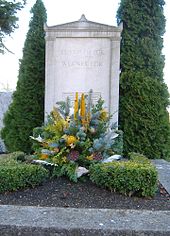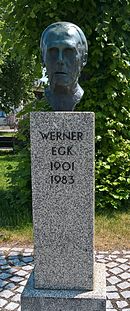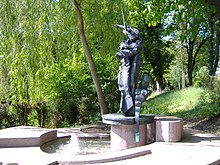Werner Egk

Werner Egk (born May 17, 1901 in Auchsesheim near Donauwörth ; † July 10, 1983 in Inning am Ammersee ; actually Werner Joseph Mayer ) was a German composer .
The original pseudonym Egk is "an acronym of E in g uter K omponist" or " E in g Rosser K artists receive" - other anecdotes claim that it is a anagram of the initials of his wife, the G eigerin E lisabeth K . Arl Egk used it since their marriage in 1923. In 1937 it became his official family name.
Egk is a representative of German neoclassicism and modern music theater and is occasionally referred to as the “composer of the reconstruction”.
Life
Egk was the third child of the teacher Joseph Mayer and his wife Maria, geb. Buck. In 1908 the family moved to Augsburg , where he attended the humanistic grammar school near Sankt Stephan from 1911 , received his first piano lessons and attended the city conservatory in 1919/20 . After graduating from high school, he first took private singing and piano lessons and then studied composition and conducting in Frankfurt am Main and later with Carl Orff in Munich .
Career in the National Socialist State
From 1930 to 1933 Egk worked for Bayerischer Rundfunk , where he began his career as a conductor as a guest conductor in 1935 , which he continued as Kapellmeister at the Staatsoper Unter den Linden in Berlin between 1936 and 1940 . He then settled down as a freelance composer, mainly in Lochham near Munich . Between 1941 and 1945 he was head of the composers' council of the STAGMA ( state-recognized society for musical performance rights ) in the Reichsmusikkammer .
In 1933 Egk set the NS festival Job, der Deutschen, written by Kurt Eggers to music . At the 1936 Summer Olympics in Berlin, he received an Olympic gold medal in the “orchestral music” category for his work Olympic Festival Music . In May 1938 his cantata Natur-Liebe-Tod was performed at the final concert of the first Reichsmusiktage in Düsseldorf (with the disgraceful show of degenerate music ). His opera Peer Gynt was premiered in November 1938 . Propaganda Minister Joseph Goebbels noted in his diary on February 1, 1939: “I am very enthusiastic and so is the Führer . A new discovery for both of us ”.
In 1939 he was awarded a music prize by Goebbels. In May 1941 he was responsible for the music for the HJ film (state commissioned film) boys with the march of the German youth to a text by Hans Fritz Beckmann ("Drive, drive we, the flag is blowing! Greater Germany is our proud ship, that's what we stand for, man for man ”).
Egk was on the list drawn up in 1944 as one of the most important composers of the Nazi state .
Arbitration chamber proceedings and trial before the Munich Regional Court
In 1969, Werner Egk sued the composer and music critic Konrad Boehmer in a lawsuit before the Munich I Regional Court . Boehmer had spoken in an anthology of criticism / by whom / for whom / how of the Hanser-Verlag about Werner Egk as "one of the worst figures of National Socialist music policy". The procedure was concluded with a settlement. Already 1947 Egk struggled in a denazification process , among other things against the claim of the witness Kurt Arnold that he at the premiere of " Don Carlos " at the Berlin State Opera to sitting in the proscenium box Goering with his hand raised to the Hitler salute was welcomed and battered chopping. He, Egk, only gave the signal for the horns on the left under the box. In its reasoning, the court stated:
- “When National Socialist barbarism came to power in Germany in 1933, it was a great disappointment that the intellectual leadership class instead of resisting one after the other made pacts with National Socialism. The resistance weakened more and more, the lucid became lonely and became powerless. There is an obligation at all times and for all those who are above average to set an example. Everyone who made his work and his name available to National Socialism was guilty of this. Egk cannot be spared this accusation either ”.
Abraxas scandal
On June 6, 1948, Werner Egk's ballet Abraxas , based on the dance poem “Der Doktor Faust” by Heinrich Heine , had its world premiere at the Prinzregententheater in Munich. The choreography came from Marcel Luipart . After five successful performances, the then Bavarian Minister of Culture Alois Hundhammer forbade a resumption of the work in the following season. The main trigger of the affair, also known as the "Abraxas scandal", was the depiction of a black mass integrated into the play, which was perceived as offensive by church circles in particular . In addition to controversial state parliament debates, the composer filed a lawsuit for damages in 1950, which ended in a settlement. Among other things, Egk was promised that three of his works would be included in the program of the Bavarian State Opera by 1955 . Abraxas was staged in a new production in Berlin (from 1949 to 1956 a total of 95 performances) and through guest appearances in the rest of Germany until the 1960s.
Career in post-war Germany

After the end of the war, Egk worked from 1950 to 1953 as director of the " Hochschule für Musik " in West Berlin. In 1950 he became President of the German Composers' Association, which he co-founded, and Chairman of the Supervisory Board of GEMA , in 1951 a member of the Bavarian Academy of Fine Arts, in 1964 a member of the Broadcasting Council of the Bavarian Broadcasting Corporation, honorary member of the Dramatiker Union eV, honorary member of the Augsburg Municipal Theaters and guest conductor of the Bavarian State Opera Munich. 1968 President of the German Music Council and 1976 President of the Confédération Internationale des Sociétés d'Auteurs et Compositeurs (CISAC).
The composer found his final resting place in the Donauwörth municipal cemetery . Donauwörth made him an honorary citizen in 1971.
plant
Operas
- Columbus . Funkoper (1933) or Opera (1942)
- The magic violin (after Franz Graf von Pocci , libretto by Ludwig Strecker ) (1935; revised 1954)
- Peer Gynt after Henrik Ibsen (1938)
- Circe after Pedro Calderón de la Barca (1945, first performance 1948; revised as Opera semibuffa under the title 17 Days and 4 Minutes , 1966)
- Libretto for Abstract Opera No. 1 for Boris Blacher (1953)
- Irish legend based on William Butler Yeats (1955; revised 1975)
- The Auditor according to Nikolai Gogol (1957)
- The engagement in San Domingo after Heinrich von Kleist (1963)
Ballets
-
Joan von Zarissa for speaker, mixed choir, soprano, baritone and orchestra (1940)
- from it a concert suite and a triptych for orchestra
-
Abraxas . Faust Ballet after Heinrich Heine (1948)
- from it a concert suite
- A Summer's Day (1950)
-
The Chinese nightingale after Hans Christian Andersen (1953)
- from it a divertissement for string orchestra
- Casanova in London (1969; from this English suite )
Orchestral works
- Drama music for the Munich Schaubühne (before 1924)
- Little Symphony (1926)
- Olympic Festival Music (1936; with text by Carl Diem )
- Orchestra sonata (1947/48)
- French suite after Jean-Philippe Rameau (1949; as ballet 1952)
- Allegria (1952; as ballet 1953)
- Variations on a Caribbean Theme (1959; as a ballet entitled Danza , 1960)
- 2nd sonata for orchestra (1969)
- Mirror Time (1979)
- Music for a lost romance . Overture (1980)
- The auditor . Concert suite for trumpet and chamber orchestra (1981)
- The magic violin . Overture in a version for wind instruments (1981)
- Canzona for violoncello and orchestra (1982)
- Nachtanz (Opus postumum, first performance 1985)
Vocal music
- Fearlessness and benevolence . Oratorio for tenor, mixed choir and orchestra; (1930/31; new version 1959)
- Altius - citius - fortius . Olympic Cantata (1936)
- La tentation de Saint Antoine d'après des airs et des vers du 18e siècle for alto, string quartet and string orchestra (1952; as ballet 1969)
- Empathy . Cantata for soprano and orchestra after Klabund (1975)
Singing games
- The lion and the mouse . Singspiel for children (1931)
- The fox and the raven . Singspiel for children (1932)
- The story of the knight Don Juan from Barcelona . After an old folk game (1932)
Film music
- Jungens (HJ film with students from the Adolf Hitler School in Sonthofen from 1941)
- The Lord from the Other Star (film with Heinz Rühmann from 1948)
Fonts
- 1953: Abstract Opera No. 1 - Libretto (Music: Boris Blacher )
- 1958: The Magic Bed - Comedy
- 1960: Music, Word, Image - Essays
- 1973: Time Doesn't Wait - Autobiography
Awards and honors
- 1936: Golden Olympic medal for orchestral music, Olympic festival music
- 1955: Member of the Academy of Arts, Berlin (West)
- 1961: Ludwig Spohr Prize of the City of Braunschweig
- 1962: Bavarian Order of Merit
- 1965: Corresponding member of the Akademie der Künste, Berlin (East)
- 1970: Large Federal Cross of Merit with a star
- 1972: Cultural Prize of Honor from the City of Munich
- 1979: Bavarian poet thaler
- 1981: Bavarian Maximilian Order for Science and Art
- 1981: Honorary citizen of the city of Munich
- 1971: Honorary citizen of the city of Donauwörth
The Werner Egk Elementary School in Augsburg-Oberhausen has been named after the composer who grew up here since 1994. By resolution of the school community and on the recommendation of the government of Swabia, it was to be renamed Primary School Augsburg Oberhausen Mitte in 2019 . The Augsburg city council rejected this renaming by a majority of CSU and Pro Augsburg in the same year.
In Donauwörth he is remembered by the magic violin fountain (on the promenade), the Werner-Egk meeting place and the Werner-Egk music school .
See also
literature
- Catalog of works Werner Egk . Schott, Mainz 1969
- Ernst Krause: Werner Egk: Opera and Ballet . Wilhelmshaven 1971
- Werner Egk: Time doesn't wait. Artistic, historical and private things from my life . Mainz / Munich 1981, ISBN 3-442-33059-9
- Werner Egk. List of published works . Schott, Mainz 1991
- Ernst Klee : The cultural lexicon for the Third Reich. Who was what before and after 1945. S. Fischer, Frankfurt am Main 2007, ISBN 978-3-10-039326-5 .
- Fred Prieberg: Music in the Nazi State , Fischer TB, ISBN 978-3-920862-66-8
- Michael H. Kater: Composers under National Socialism , Parthas Verlag 2004, ISBN 3-936324-12-3
- Dominik Frank: Werner Egk . In: Jürgen Schläder (Ed.): How one becomes what one is. The Bavarian State Opera before and after 1945 . Henschel, Leipzig 2017, ISBN 978-3-89487-796-5 , pp. 272 f .
Documents
Letters from Werner Egk are in the holdings of the Leipzig music publisher CF Peters in the Leipzig State Archives .
Web links
- Works by and about Werner Egk in the catalog of the German National Library
- Sound samples, sheet music samples, biography, works, photos and publications
- Short biography, chronology, current performances, audio samples and list of works ( Schott-Verlag )
- operone.de
- Klassika.info
- Werner Egk in the Bavarian Musicians' Lexicon Online (BMLO)
- Audio sample: Weapons dance , recording from 1936
Individual evidence
- ↑ Schott Music: Werner Egk - Chronologie ( Memento of December 7, 2014 in the Internet Archive ), accessed on September 12, 2012.
- ^ Fred Prieberg: Music in the Nazi State . Fischer publishing house.
-
↑ Terrible things . In: Der Spiegel . No. 19 , 1969 ( online ). Restoration of honor . In: Die Zeit , No. 9/1970
- ↑ Kiu Eckstein : One Life - Two Worlds. Biographical Notes in Times of Change. Hamburg 2017 p. 34f .; ISBN 978-3-7439-3297-5 ; Eckstein writes that Werner Egk's family secretly heard the BBC and that his mother testified in this case.
- ↑ From the judgment of the Spruchkammer München-Land Mü-La 146/46/3636 of October 17, 1947.
- ↑ Ulrike Natzer and Bernhard von Zech-Kleber, Abraxas scandal, published on December 13, 2016, in: Historisches Lexikon Bayerns . Last access: July 17, 2020
- ↑ Fred K. Prieberg : Handbook of German Musicians 1933–1945 , CD-Rom-Lexikon, Kiel 2004, p. 1309.
- ↑ Miriam Zissler: This is the name of the Werner Egk School in Augsburg in the future. In: augsburger-allgemeine.de. Augsburger Allgemeine, accessed on February 27, 2019 .
- ^ Michael Hörmann: City council decides: Werner Egk School keeps its name. Retrieved May 30, 2019 .
| personal data | |
|---|---|
| SURNAME | Egk, Werner |
| ALTERNATIVE NAMES | Mayer, Werner Joseph (real name) |
| BRIEF DESCRIPTION | German composer |
| DATE OF BIRTH | May 17, 1901 |
| PLACE OF BIRTH | Auchsesheim |
| DATE OF DEATH | July 10, 1983 |
| Place of death | Inning am Ammersee |


